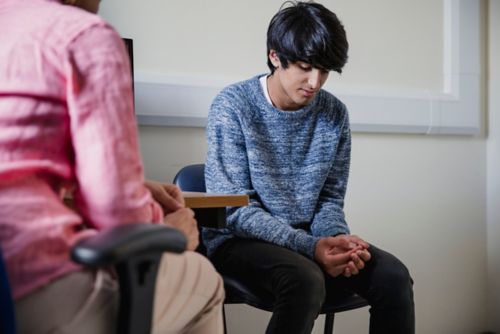During your teens and 20s, you are becoming more independent. You’re figuring out who you want to be and what kind of life you want to build.
It’s a time of life filled with milestones — graduating from high school, finding a partner, starting a family, making friends, and choosing a career.
When cancer happens, you find yourself more dependent on others. You may want to be free of your parents, but at the same time, you may need someone to take care of you. You may feel a loss of control.
Your life may be put on hold when you’re diagnosed with cancer. Your immediate life goals -- at least temporarily -- will shift to aims that are cancer-related – going to appointments, getting treatments, adjusting to clinic/ hospital life, and dealing with side effects.
It’s normal and healthy to have an emotional reaction to your cancer diagnosis. You may go through denial, frustration, sadness, anger, fear, hope, distress, guilt or something else. Everyone reacts differently.
- The emotions you feel are valid and real.
- Other people know how you feel. You are not alone.
- There are people who can help you cope with these feelings.
Be honest about feelings
It may be tempting to avoid thinking about what is going on in your life right now. “If I don’t think about it, it’s not real.” It might even seem like avoidance works at first, but it’s not a solution. If you keep feelings bottled up, they may come out in other ways. You might yell at your mom when you normally wouldn’t have or have a meltdown over something relatively minor.
It can be really difficult because you’re feeling a lot of emotions you haven’t experienced before. If no one in your family or friend group has dealt with these feelings before it’s hard to know how to handle them. Sometimes you may feel like you have to keep up a strong front, especially when others say things like “You’re so strong, you’re so brave.” But it’s OK not to be OK.
In fact, psychologists often say it worries them is when a patient constantly says “I’m good. I’ve got this.” It might mean you’re not dealing with what is going on emotionally.
Sometimes you may want to keep feelings inside because you don’t want to worry your parents. You may think: “I can’t add something else. They’re already going through so much.”
But it’s important to express your feelings. Being honest about emotions can be scary. You’re making yourself vulnerable.
How to process your emotions
It’s helpful have someone to talk to, to help you process what you’re going through. If you keep thoughts inside your mind, a small negative thought could grow and possibly become distorted.
An important part of processing emotions is thinking about how you are feeling and putting a name on that emotion. When you voice how you are feeling, you can gain perspective. It can change how you think and correct errors in that thinking.
But it can be hard to label your own emotions especially when you haven’t experienced them before. You don’t have to figure out things all at once. Emotions can change quickly. It may seem like a rollercoaster. Give yourself time to ride it. Try to develop a sense of what triggers you to blow up or helps you calm down.
It’s good to get your feelings out in some way. Processing can be talking to someone, journaling, writing a song, painting, listening to music, or building something. You may want to look for reputable blogs or follow social media influencers who provide information about emotional health.
Ultimately, you may get to a place where you can make meaning from your cancer experience. It may take a while to get there. Don’t be too hard on yourself. Don’t feel guilty if you are not feeling thankful or in a place where you want to give back. On the other hand, don’t feel like you have to suppress positive feelings because you want to show family and friends you are taking things seriously.
Try to pay attention to the activities you are doing and the people you are with when you feel good. Lean into these resources when you are having a hard day.
How to find providers
In addition to reaching out to family and friends who are supportive, you may want to also talk to a provider such as a psychologist (PhD or PsyD), psychiatrist (MD), licensed clinical social worker (LCSW), licensed professional counselor (LPC), certified child life specialist (CCLS), or chaplain. These professionals have received years of training and can be a neutral source of support. Your treatment center may also have music and art therapists who can help.
If you need to find a provider in your community, your primary care provider, pediatrician, or school counselor can provide referrals. Parents, family members and friends of the family may know of therapists. If you are a college student, your school may have a counseling center on campus.
If you are covered by your parents’ insurance (or have your own insurance), look for recommended providers who are covered by your insurance plan. If these services are not covered by insurance, look for resources at community health clinics. Colleges and universities often have counseling services. Also, some private practices may offer services on a sliding scale based on your income level.
Remember there is no right or wrong way to travel this path in life. What is important is to take stock of how you feel and express those emotions. This process can help you decide how to move forward.




